Key takeaways:
- Embedding child safeguarding principles requires active participation and accountability from all members of an organization.
- Regular training and feedback mechanisms enhance accountability and ensure continuous improvement in safeguarding practices.
- Effective policy implementation involves clear communication, relatable examples, and collective tracking of progress to foster a culture of trust.
- Flexibility and open dialogue are essential when addressing challenges and resistance in policy changes, promoting stronger commitment and learning.
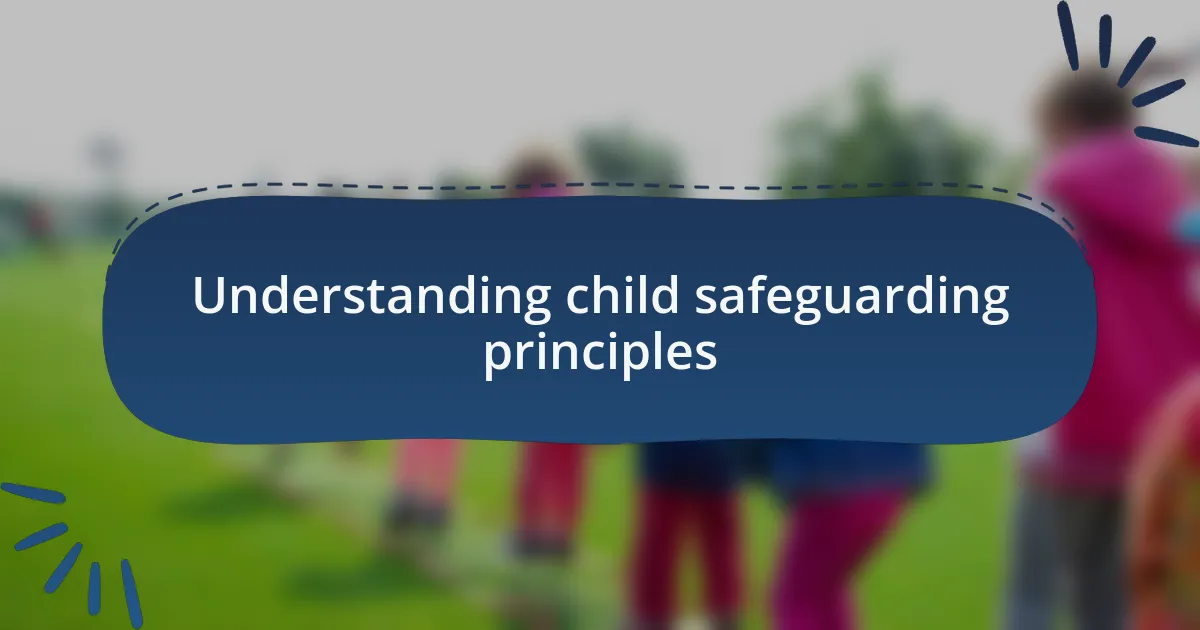
Understanding child safeguarding principles
Child safeguarding principles are fundamentally about protecting the rights and welfare of children. I’ve seen firsthand how crucial it is to embed these values into every policy and action taken by organizations. When I worked on developing guidelines, I often reflected on the notion: How do we ensure that every child feels safe, valued, and heard in their environment?
One of the key principles is the idea of ‘participation.’ Children should be given a voice in matters that affect them. I remember facilitating workshops where children shared their experiences and concerns. Their insights shaped our policies in ways I had never anticipated. It highlighted for me that listening isn’t just a task; it’s a vital part of safeguarding.
Moreover, the principle of accountability can never be overstated. It’s not merely about having structures in place but about fostering a culture where everyone feels responsible for the welfare of children. There were moments when I questioned whether our approaches would stand the test of scrutiny, and I realized that transparency in our processes fostered trust. How do we build that trust? By consistently ensuring that every action we take prioritizes a child’s safety.
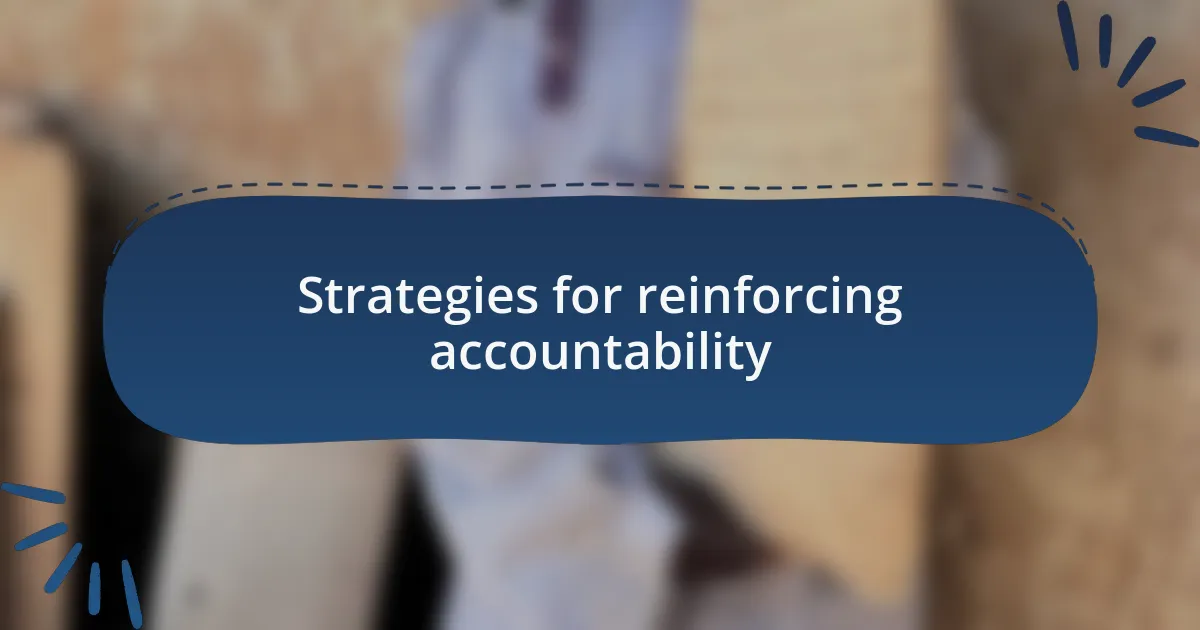
Strategies for reinforcing accountability
Reinforcing accountability in child safeguarding requires clear, measurable objectives within policies. I remember collaborating with a team to draft specific benchmarks that not only defined our goals but also outlined the expected outcomes for each initiative. This clarity empowered everyone involved to take ownership of their roles and fostered a sense of responsibility; it was no longer just the organization’s mandate, but a collective commitment to safeguarding children.
In my experience, regular training sessions can profoundly impact accountability. I once attended a workshop where the facilitator encouraged us to examine case studies that detailed both successful and failed safeguarding efforts. The emotional weight of these stories reminded us of our duty, pushing us to reflect on our impact. How many of us have left a training session invigorated to create change? I certainly have, knowing there’s a fresh way to engage with the policies we uphold.
Finally, establishing feedback loops is essential for maintaining accountability. When I initiated anonymous surveys to gather insights from staff and stakeholders, I was often surprised by the honesty expressed regarding our practices. This process not only allowed for recognition of successes but also illuminated areas needing improvement. Isn’t it fascinating how sometimes the loudest voices in the room are the ones we least expect? By welcoming this feedback, we create a nurturing space for growth and reinforce our collective responsibility for safeguarding.
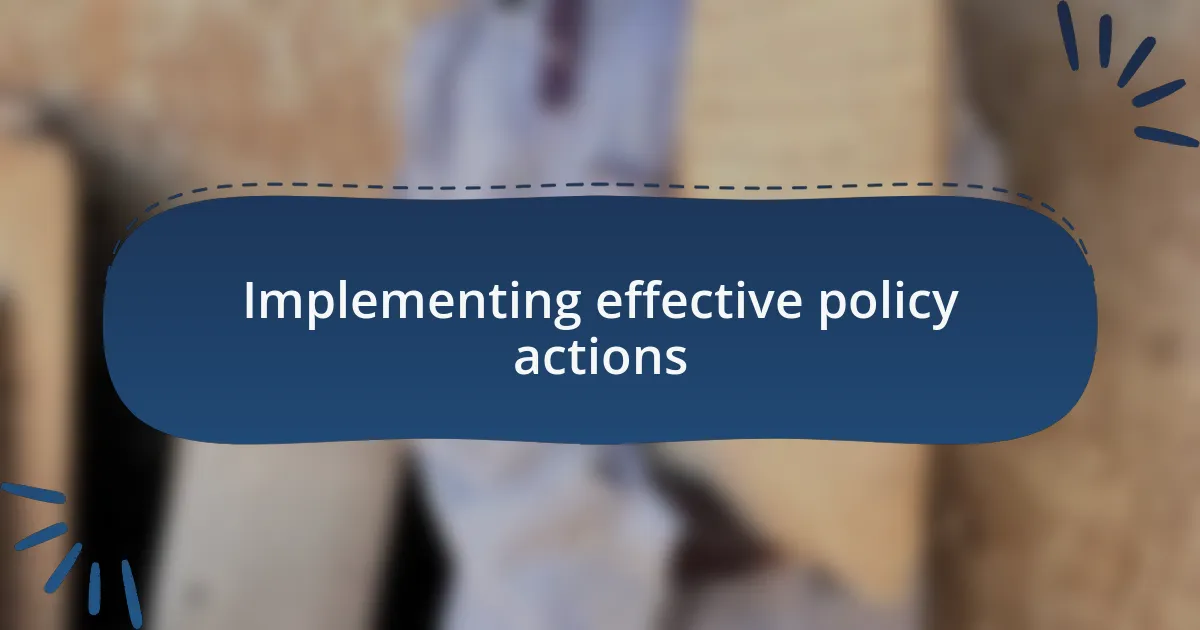
Implementing effective policy actions
Implementing effective policy actions begins with ensuring that every team member understands their role in the broader safeguarding framework. I recall a time when I facilitated a meeting to break down a complex policy into digestible parts, converting legal jargon into everyday language. Witnessing the moment when colleagues’ expressions shifted from confusion to clarity was incredibly rewarding; it was like a light bulb turning on. Can you envision how much more effective a team can be when everyone is genuinely aligned?
Another critical aspect is the use of real-life examples during implementation. I once shared a story about a child who experienced remarkable support from a newly introduced policy. The personal connection we all felt to that narrative transformed the room’s energy, making the policies feel less abstract and more like lifelines. How many times have we been motivated by a story that resonates on a deep level? This emotional engagement is essential for fostering a committed implementation process.
Finally, tracking progress through transparent reporting mechanisms can profoundly influence the effectiveness of policy actions. I initiated a monthly review where we highlighted both achievements and challenges in a communal setting. The feeling of accountability was palpable as we collectively examined our progress; instead of shying away from difficulties, we embraced them as opportunities for improvement. Isn’t it amazing how a shared goal can cultivate a culture of trust and open dialogue among team members?
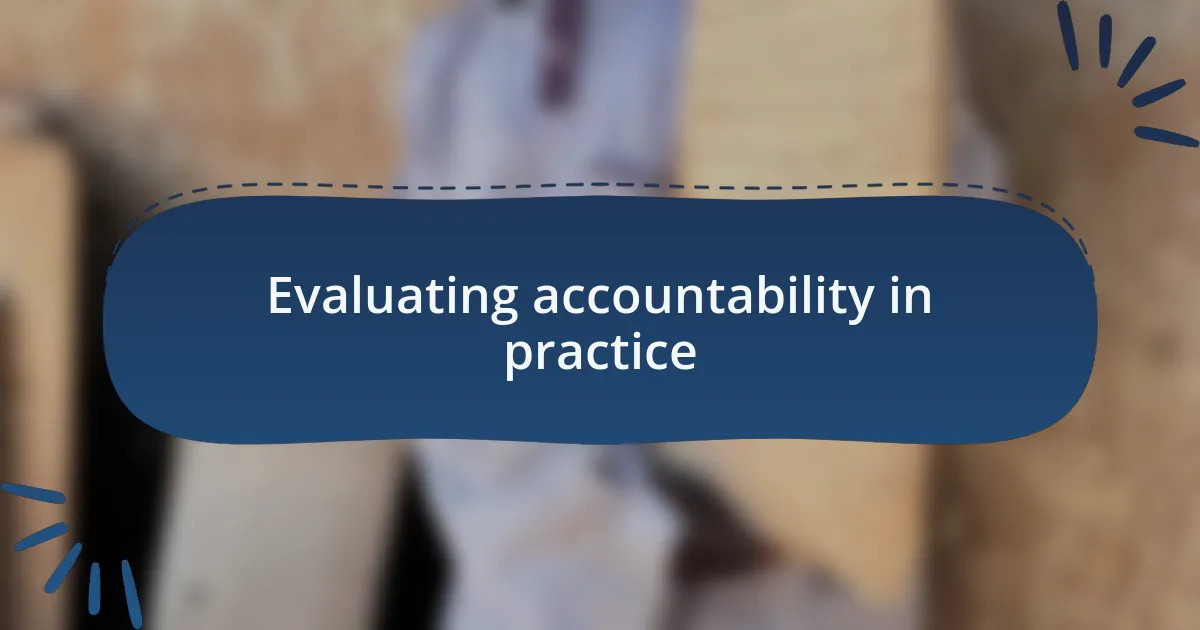
Evaluating accountability in practice
Evaluating accountability in practice requires continuous reflection on our actions and their outcomes. I vividly remember a situation where we reviewed a safeguarding initiative after several months of implementation. We identified not only what was working—like the enhanced communication pathways—but also the areas where we had fallen short, particularly around staff training. It often surprises me how much we can learn from these honest evaluations. Have you ever experienced a moment where a seemingly small oversight revealed a much deeper issue?
In one instance, a peer expressed frustration over the inconsistency in following up on safeguarding reports. Inspired by that candidness, I proposed a real-time tracking tool that allowed us to see the status of each case clearly. This not only increased individual accountability but also encouraged a shared responsibility within the team. It made me realize how crucial it is to create an environment where team members feel safe to voice concerns. How do you think transparency influences accountability in your own practice?
Moreover, I’ve found that engaging stakeholders—especially the children and families we serve—offers invaluable insights into our accountability measures. One family had shared feedback that made us reconsider certain methods we thought were effective. Learning directly from those impacted by our policies reinforced the idea that accountability is not just about internal practices; it’s about fostering a responsive relationship with those we aim to protect. How often do we think about what accountability looks like from the perspective of those we are serving?
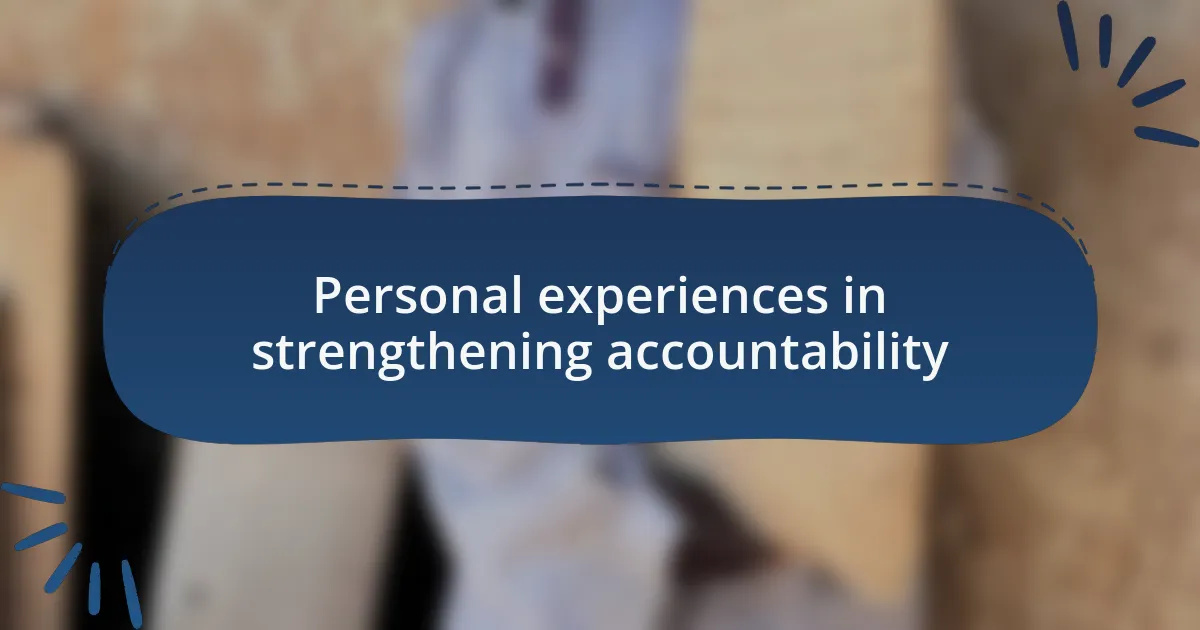
Personal experiences in strengthening accountability
In my journey to strengthen accountability, one powerful moment came during a team meeting where we discussed our safeguarding success stories. I vividly shared how a child’s thoughtful feedback after a workshop led to significant tweaks in our approach, illustrating that accountability often starts with listening. Reflecting on that experience made me wonder: how often do we actively seek out those voices that can guide our path forward?
Another impactful experience was when I initiated a peer mentorship program focused on accountability. I paired less experienced staff members with seasoned professionals to create an environment of learning and support. Watching them hold each other accountable made me rethink the dynamics of our workplace—it wasn’t just about meeting standards; it was about cultivating a culture where everyone felt empowered to take ownership of their roles.
Additionally, collaborating with local organizations provided me with a deeper understanding of our community’s needs. During a workshop, a participant challenged my assumptions about our policies, opening a dialogue that highlighted gaps in our practices. This reminded me how critical it is to embrace constructive criticism—sometimes the most eye-opening insights come from those we least expect. How has engaging with others changed your perspective on accountability?
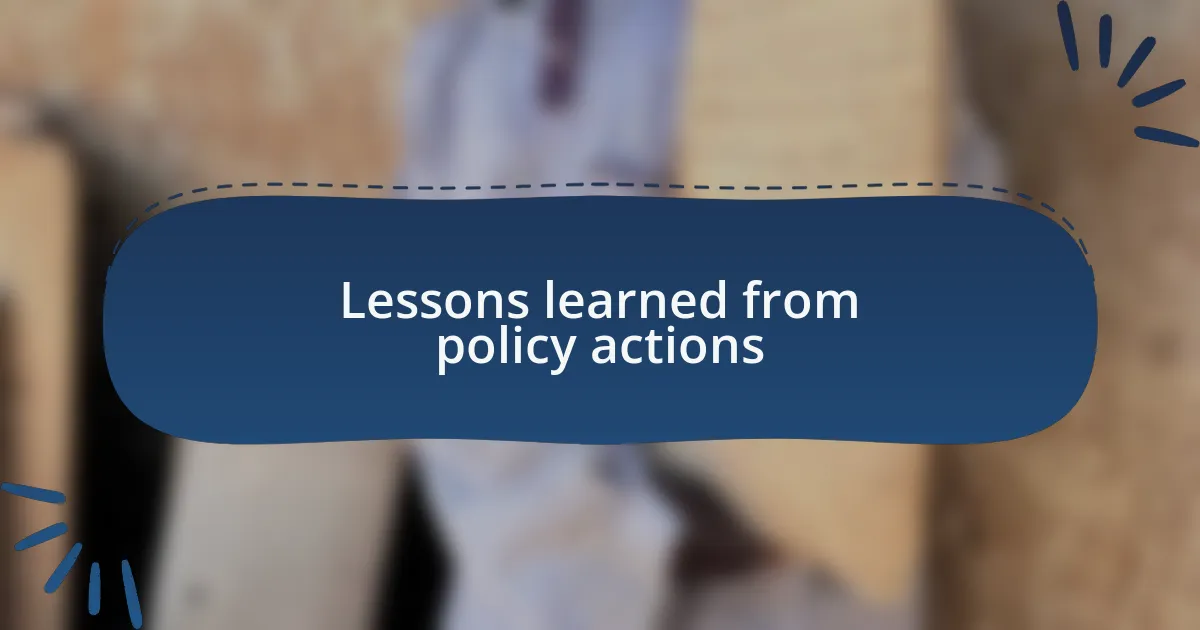
Lessons learned from policy actions
Reflecting on my experiences, I realized a key lesson from our policy actions is that flexibility is crucial. During a particularly challenging project, we had to pivot quickly in response to feedback that pointed out shortcomings in our safeguarding measures. This taught me that an adaptive approach not only enhances effectiveness but also fosters trust with the community we serve. Isn’t it fascinating how adaptability can transform setbacks into opportunities for growth?
In another instance, we faced resistance when introducing a new policy intended to strengthen accountability. Initially, I felt discouraged, but I soon understood that change can be unsettling. By facilitating open discussions and addressing concerns transparently, we managed to bring everyone on board and build a stronger commitment to our goals. This experience illuminated the importance of communication—how many times have you seen misunderstanding derail a well-intentioned initiative?
Lastly, I’ve learned that documenting our processes and outcomes is invaluable. When we implemented a tracking system for policy adherence, it revealed patterns we hadn’t noticed before. This clarity not only improved our accountability efforts but also empowered our team to take ownership of their contributions. Have you ever seen the power of data transform perceptions within your organization? It’s remarkable how much clearer the path to accountability becomes when we have the right tools in place.